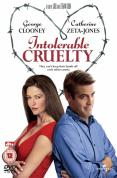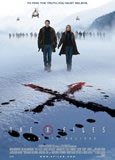
| Home |
| News |
| Blog |
| Films |
| Poetry |
| Drama |
| Music |
| Articles |
| Books |
| Video Clips |
| Links |
| Newsletter |
| Contact |
Blog August 2008
10/8/08
A few films I saw recently on TV got me thinking again about religion
in the movies, and in many cases there were interesting marriage scenes
that might be useful ice breakers in class when discussing relationships
and marriage.
 Intolerable
Cruelty is another cracking film from the Coen brothers (their most
recent being Oscar winner No Country for Old Men). It was quite
raunchy in spots, but was a marvellous send up of American divorce culture.
Despite all the marital shenanigans the film did seem to favour real love
and lifelong commitment. Dealing as it did with marriage, it wasn't surprising
that religious imagery figured - there was one wedding scene in particular
worth mentioning. It was a garden wedding, and the priest, strumming his
guitar, approached the happy couple while singing Simon and Garfunkel
songs! Grist to the mill, I'd suspect, for those who might not be enthusiastic
about the liturgical changes of recent years. The "religious" wedding
was a more attractive proposition than a later registry office wedding
which had a Scottish theme, complete with a bagpipe version of Bridge
Over Troubled Water. Yuk! I didn't find the religious wedding imagery
in any way offensive, perhaps because there was a good humoured warmth
about the film.
Intolerable
Cruelty is another cracking film from the Coen brothers (their most
recent being Oscar winner No Country for Old Men). It was quite
raunchy in spots, but was a marvellous send up of American divorce culture.
Despite all the marital shenanigans the film did seem to favour real love
and lifelong commitment. Dealing as it did with marriage, it wasn't surprising
that religious imagery figured - there was one wedding scene in particular
worth mentioning. It was a garden wedding, and the priest, strumming his
guitar, approached the happy couple while singing Simon and Garfunkel
songs! Grist to the mill, I'd suspect, for those who might not be enthusiastic
about the liturgical changes of recent years. The "religious" wedding
was a more attractive proposition than a later registry office wedding
which had a Scottish theme, complete with a bagpipe version of Bridge
Over Troubled Water. Yuk! I didn't find the religious wedding imagery
in any way offensive, perhaps because there was a good humoured warmth
about the film.
The
wedding scene in Wedding Daze was more problematic. A third rate
made-for-tv movie, it started well I thought, as a warm tale of a father
and his three daughters, but it quickly descended into pure and irritating
corn. A triple wedding was arranged, the father delighted in the money
he was saving in not "renting" the cathedral. This time the priest didn't
turn up at all and so, as they weren't too fussy they persuaded a nearby
rabbi to do the honours! The religious sensibilities of a groom's Italian
parents were quickly overcome.
I really enjoyed The Bachelor, which starred Chris O'Donnell as
a young man with commitment issues. His miserable efforts at proposing
to his loved one were particularly hilarious. When told he must marry
by a certain deadline to inherit the family fortune and save the family
company he becomes even more desperate, leading to one of the most bizarre
wedding scenes ever (the priest is in a police car, the groom on a nearby
fire escape, and the bride sandwiched between hundreds of other brides).
And there's an earlier attempted wedding of convenience that might also
be a useful clip for R. E. class. The film is ultimately pro-marriage
and pro-commitment, but some may find the treatment of the sacrament lacking
in respect. The Catholic priest (another fine turn by James Cromwell)
seems quite willing to go along with efforts at the inheritance driven
marriage with scant regard for Church standards, but there is a touching
scene, about two thirds way through, where he has a chat with the groom
in a boat - telling how he was married with children and became a priest
late in life when his wife died - he has only the best of praise for marriage
and this helps the groom to overcome his fear of being tied down.
More troubling was the use of religious imagery in Shanghai Noon,
This was one of Jackie Chan's comedy martial arts westerns so we can't
get too worked up about it, but for no reason to do with the plot the
final shoot out took place in a church. From the statement of the crooked
Marshall Van Cleef (a good, bad, or ugly joke?) - "I'm glad to see we're
all church goers here", it smacked of disrespect. Statues were shot to
bits and we were supposed to laugh. In fact the whole church was pretty
much wrecked when the mayhem was over. Overall it was a funny film, but
it's hard to find sacrilege and desecration funny.
The religious imagery in Before and After was brief but more positive
- we saw a funeral scene with a priest comforting a woman whose daughter
had been killed - an image that's more true to life. The young man who
was the chief suspect ran away from home, but wrote to his parents, telling
them he knew they didn't pray, but asking them to pray now, for him. The
father (Liam Neeson) impulsively covered up for the son, but the mother
(Meryl Streep) was more pure of heart - she wanted to do what was right
and tell the truth, even though she was mocked for her principles and
"absolutes" - not too often you find a leading character supporting the
idea of objective and absolute truth. Not only that but the film seemed
to support that point of view - it was seen as a healthy thing for the
family to face up to the truth, even though there was a cost. The film
wasn't entirely enthusiastic to religion however - some religious bigot
harassed the family by phone when the son was a suspect (yes, I know,
there are plenty like that who give religion a bad name), and there was
a negative comment from the father about the Abraham and Isaac story,
which raised father-son issues that he thought relevant to his own situation.
Overall a thoughtful and unpredictable film.
8/8/08
 Finally
got to see The X-Files: I Want to Believe, recently arrived in
Irish cinemas. There are lots of scenes I'd like to look back on, so perhaps
I'll revise my initial opinions when it comes out on DVD. First off, it
was great to see Mulder and Scully back in action - it's been about 6
years since the TV show ended. The film was certainly true to the spirit
of the show, though apart from the principals only one other character
reappeared. As with the TV show there were strong religious elements -
the title "I Want to Believe" says it all.
Finally
got to see The X-Files: I Want to Believe, recently arrived in
Irish cinemas. There are lots of scenes I'd like to look back on, so perhaps
I'll revise my initial opinions when it comes out on DVD. First off, it
was great to see Mulder and Scully back in action - it's been about 6
years since the TV show ended. The film was certainly true to the spirit
of the show, though apart from the principals only one other character
reappeared. As with the TV show there were strong religious elements -
the title "I Want to Believe" says it all.
I'd say religious believers won't be entirely happy with the way religion
is presented - one of the main characters is a paedophile former priest,
still referred to as Father Joe, played with deadly earnestness by comedian
Billy Connolly, a strange but effective casting choice. Scully can't hide
her revulsion when in his presence, but at least he seems repentant. So
though, on one level, the character might be reinforcing lazy stereotypes,
he is humanised and challenges the judgementalism of Scully and the viewer.
But there is negative portrayal of other priests also - in particular
a rather cold fish at the Catholic hospital where Scully is treating a
young boy for an apparently incurable disease. At best this priest is
a fussy administrator, but the young boy says he doesn't like the way
this priest is looking at him.
The plot centres around "Father Joe" helping the police find some missing
women because he says he has been having visions. Is he in league with
the perpetrators or has God answered his prayers of repentance? Mulder
in particular wants to believe he is genuinely psychic, but Scully is
more doubtful, still conflicted about such matters, though Fr Joe describes
her as "a woman of faith". She was often thus in the series, so it seems
her character hasn't progressed much in the intervening years, and for
that matter Mulder seems driven by the same concerns as always, though
the alien theme of the so-called "mythology" episodes doesn't figure this
time. There are many discussions about faith during the film, especially
a dramatic confrontation between Scully and Fr Joe when she reluctantly
goes to seek his help - (in this scene he says of abusers that they hate
themselves and hate each other). Other discussions fall into the trap
of wordiness that was one of the faults of the TV show. These are the
scenes I'd like to see again to form a more rounded judgement.
The plot also features the stem cell research issue, and treats it in
an interesting way - Scully dabbles in it to try and save her young patient,
but the bad guys are also into it for more gruesome purposes, so it advocates
and critics alike may feel somewhat satisfied. The distinction between
adult and embryonic stem cell research doesn't figure.
For most of the X-Files series Mulder and Scully were just good
friends - this close but platonic relationship was one of the show's attractions,
but if I remember correctly there was a hint in the 9th series that the
relationship had become physical, and in this film they seem to be living
together at least some of the time. And in another sign of the times two
of the bad guys are married to each other! Have tried not to give away
too much here, but if you do go to see it be sure to stay until the end
of the credits!
(for my article on the religious themes in the X-Files TV series click here)